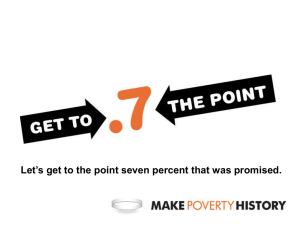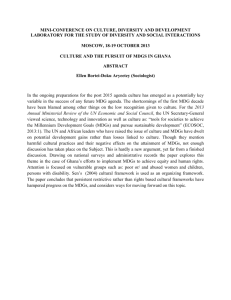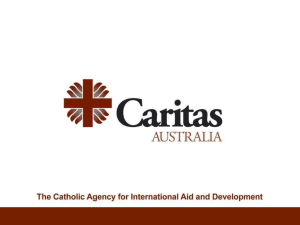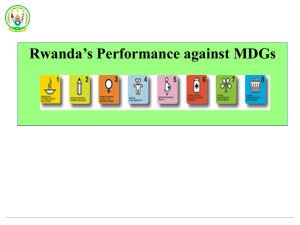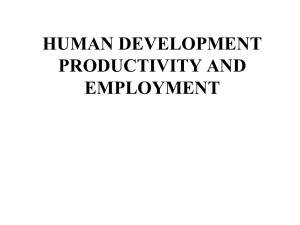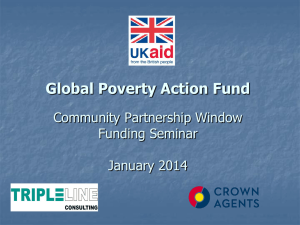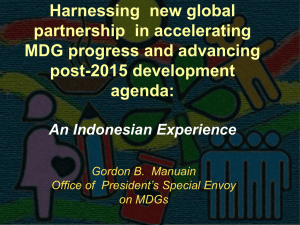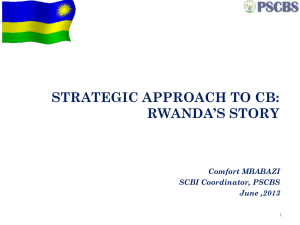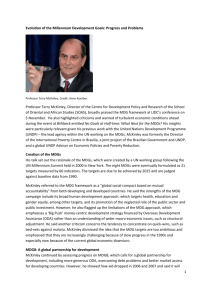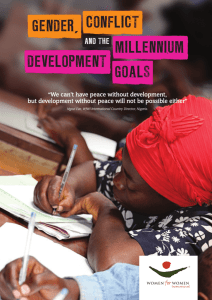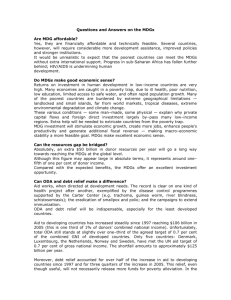MDGs success and challenges
advertisement
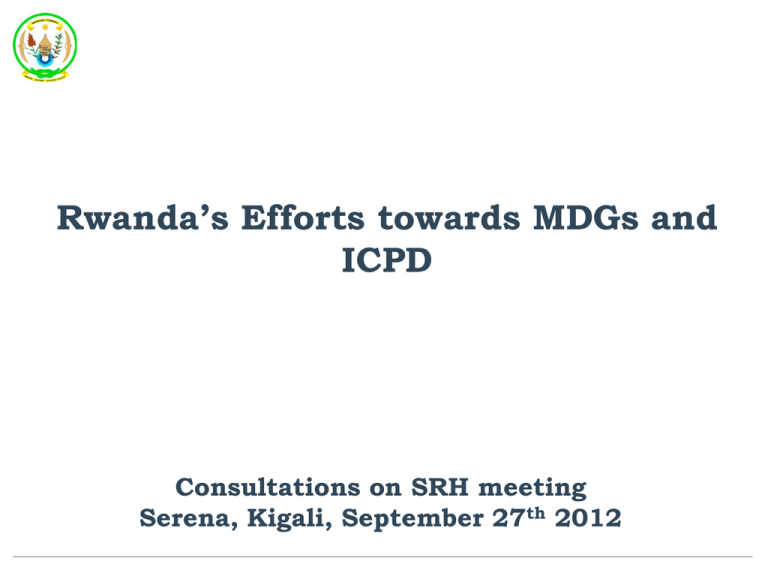
Rwanda’s Efforts towards MDGs and ICPD Consultations on SRH meeting Serena, Kigali, September 27th 2012 What do internationally agreed Goals (MDGs & ICPD) mean to us? Milestones towards our Vision 2020 & Medium Term Socio-economic plan (EDPRS) MDGs helped focus on strategic priorities and have been adapted to the local context Monitoring and Evaluation of ICPD and MDGs is also integrated to the national M&E system The National Dialogue discusses progress on MDGs A decade ago (and at time of Cairo ICPD94), the situation in Rwanda was worse than in the early 90s, so it required strong focus and commitment. Poverty levels are reducing…. More than one million Rwandans got out of poverty 80% 77% 70% Proportion 60% 60.40% 58% 57% 50% 44.90% 40% 30% 30.20% Proportion below poverty line 20% Linear projection 10% 0% 1990 1994 2000 2005/06 2010/11 2015 •More in rural(13.2%) than urban(6.4%) => reduced inequality • We can achieve MDG 1(30.2%) With Food Security, malnutrition is being eradicated… 45% 42.80% Proportion underweight 40% 35% 30% 28% 25% 24.50% 19.00% 20% 14.50% 15% 11.00% Proportion of U5 underweight 10% 5% Linear projection 0% 1990 1994 2000 2005/06 2010 2015 MDG on under-five malnutrition already achieved(we are at 11% while MDG target was 14.5%) 3 Allow to show you the situation by 2005, Rwanda was off-Track for MDG1 1990 1995 2000 2005 2015 target Status Off Track Poverty headcount N/A (%) 78 60 57 30 Extreme poverty incidence (%) N/A N/A 41 37 21 29.2 N/A 24.3 22.5 Prevalence of under 5 malnutrition (% underweight) Off Track 14.5 Off Track MDG1: Eradicate Extreme Poverty & Hunger, We are now on track for MDG1 1990 Poverty headcount N/A (%) Extreme poverty incidence (%) Prevalence of under 5 malnutrition (% underweight) 1995 2005 2010/11 78 57 45 N/A N/A 37 24 29.2 N/A 23 11 2015 target Status 30 On track 21 On track 14.5 Done MDG1: Eradicate Extreme Poverty & Hunger High economic growth rates since 2000 EDPRS 1 Since 2008, higher growth rates in agriculture The Vision 2020 Umurenge (VUP) flagship program of Rwanda’s EDPRS The one-cow per family (Girinka) program The Ubudehe program allows the community to be part of the solution to reduce their poverty Challenges remain post-2015 For sustainability of results => EDPRS 2 MDG2: Universal Primary Education 1990 1995 Net primary enrolment (%) 62 70 Completion rate in primary school (%) N/A N/A 2000 2010/11 2015 target Status 72 91.7 100 On track 22 81 100 On track Enrolment has increased with introduction of feefree 9 year basic education …..But quality proved to be a big challenge. MDG2: Universal Primary Education Facing arising challenges: Managing access shock: Need to build more schools and train more teachers (pupil to teacher ratio from 51 in 2000 to 64 in 2009) Increase availability of textbooks and teaching aide Managing financial sustainability of fee-free basic education Education solidarity fund (for vulnerable children) at district level Since 2003 capitation grants to schools were introduced Quality also implies adequacy to labour market needs MDG3: Gender Disparity 1990 1995 Women participation 17 in parliament (%) Gender equality: primary education & secondary education 2000 latest 2015 Status target 15.6 25 56 50 Done N/A 44.4 50 50 Done N/A 48.7 51.1 50 Done In 2003, new Constitution giving at least 30% of seats to women Laws discriminating against women have been abolished Changing culture is not as easy as amending laws (domestic violence, economic empowerment move slower) MDGs 4 and 5: a healthier population Maternal mortality Number of Deaths per 100,000 1200 250 Under- five mortality 1071 800 600 Number of Deaths 1000 750 611 500 476 200 150 151 152 100 400 Number of deaths Number of Deaths 200 196 268 50 Linear projection 0 1990 1992 2000 2005 2010 2015 Linear projection 76 50 0 1990 2000 2005 2010 2015 MDG 4&5: Child & Maternal Mortality Facing arising challenges: Child and Maternal mortality ratios need reducing further Introduction of Community Health Workers is instrumental in getting children treated within 24hours of onset of fever, pneumonia and diarrhea (leading causes of childhood deaths) Increase access to reproductive health services (family planning: unmet FP need at 19%), improving antenatal and emergency obstetrical care Quality of health care in general MDG6: HIV/AIDS, Malaria & other Diseases 1990 2000 HIV prevalence in population aged 15-24 (%) 2005 2010 2015 Status target N/A 13.9 3 3 On track N/A 51 26 13 On Track Malaria related deaths (%) Access to ARVs increased to reach universal access (covered under health mutuelles) Pregnant women and children under 5 getting free impregnated bednets (75% of U5 in 2010). Ongoing National campaign “eradicating malaria in Rwanda” MDG7: Environment Sustainability Land area covered by forest (%) Terrestrial area protected (%) Access to improved water source (%) Access to improved sanitation 1990 2000 2005 2010/ 2015 Status 11 Target NA 12.4 N/A 64 NA 51.5 20 22 25 On track 8 10.1 10 On track 64 74.5 82 On track 58.5 74.5 On track Protection against soil erosion, banning the use of plastic bags, planting trees but challenge of adaption 4 selected lessons to build on… Working together – with participation of population (e.g. Fast tracking 9YBE, Agriculture CIP, Health achievements) – it has proven cost effective and rapid Many home-grown initiatives turning into success stories Putting in place the adequate institutional/ legal framework for implementation –(e.g. RDB, REB, EWSA, etc.) Improved service delivery where ICT has been well mainstreamed (e.g. Immigration services, business registration, financial sector, IFMIS, etc.) Ownership of and alignment of resources have made the V2020, MDGs and the EDPRS useful guiding strategies 14 Conclusion All MDGs in Rwanda are achievable: there has been substantial progress in many areas over the last decade We need to keep up and/or scale up efforts for greater impact – in some areas Also need to deliver on economic progress to strengthen impact and ensure sustainability of results Faster and improved delivery: There is a sense of urgency to achieve set targets!! “ We do not allow statistics make us forget that we are dealing with Rwandan people’s lives” THANK YOU
